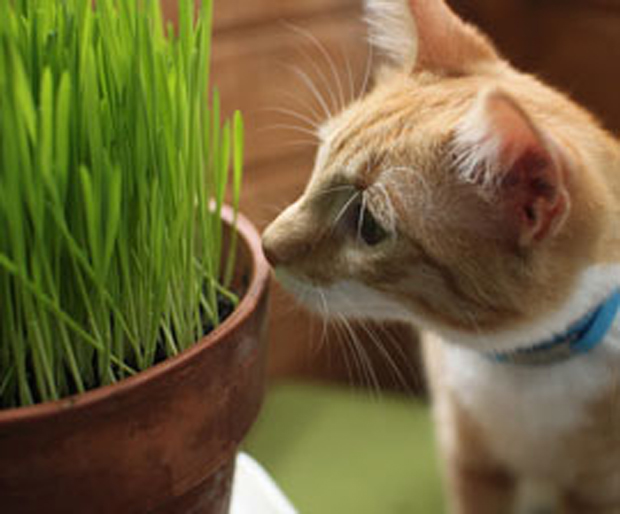This article will cover toxins specific to cats. The following are six cat poisons that we see at Long Beach Animal Hospital, and they can cause serious disease and even death. The best treatment for any of these poisons is prevention, so awareness is the key.
Lilies
This common plant can be lethal to cats. The worst ones are Easter lilies, stargazer lilies and Asiatic lilies. Calla and peace lilies do not cause toxicity in cats.
Every cat has a different level of sensitivity. They are exposed through biting or licking leaves or petals, licking lily pollen from the bottoms of their paws, or drinking water from a vase with cut lilies. A small amount of any of this can be toxic. The toxin affects the kidneys and can cause complete failure and death.
Symptoms include drooling, vomiting (look for plant pieces in the vomitus), poor appetite and excess of urination followed by no urination.

Cats love to chew on grass, and if it’s fresh and not treated with any chemicals, it will do them no harm. “Cat grass” is available at most pet-supply stores and may be a deterrent to chewing on the house plants. Photo courtesy of the Humane Society of the United States (HSUS).
Ibuprofen (Advil, Motrin, Midol, and other products including this substance) and aspirin
These drugs, known as NSAIDs, are routinely used by humans; hence, there is potential for your cat to get hold of them. Symptoms are variable and depend on how much your cat ingests over a period of time. If enough is ingested, a cat can die from this toxin. Symptoms may include vomiting with or without blood, diarrhea that is normal in color or very dark, lethargy, weakness, poor appetite and seizures.
Tylenol (acetaminophen)
This commonly used human drug is extremely toxic to cats. One pill can be fatal, causing a problem with the red blood cells and eventually leading to liver failure. Symptoms include lethargy, poor appetite, dark stools, dark gums (mucous membranes), weakness, difficulty breathing and swollen face.
Marijuana
With the advent of legal medical marijuana, we are seeing more cases of marijuana toxicity, mostly in dogs, but also in cats and horses. Fortunately, death is rare, but ingestion can provide other problems. Symptoms include deep and prolonged depression, lack of coordination, vomiting, excess salivation, dilated pupils and coma. If you insist that your cat join you in getting a buzz, there’s catnip.
Insecticides
Lawn and garden products, canine topical flea and tick medication, and any insecticide that contains pyrethrins, which are plant-derived toxins, are poisonous to cats. Cats can get exposed by licking their paws after walking through areas where these insecticides are present. If you and your cat shares a home with a dog, please keep them separate when you administer canine flea treatment/
Symptoms are highly variable and depend on the amount of ingestion. Watch for lethargy, vomiting, irritability, lack of coordination, and seizures.
Household cleaners
Kitchen surface cleaners, carpet cleaners, toilet bowl cleaners and laundry detergents can be toxic to cats. Always thoroughly rinse off any area with water before allowing your cat back into an area you’ve just cleaned. Symptoms include drooling, vomiting and difficulty breathing.
Hospital Treatment
Even though most of these poisons have no specific antidote, immediate veterinary care can save most pets if instituted early enough and your pet has not ingested an excess amount. One of the most crucial treatments in almost every case is the administration of precise amounts of IV (intravenous) fluids. Veterinaries have special machines to accomplish this.
If you suspect that your pet has been exposed to any poison, here are some phone numbers that you can call to find out how to proceed.

